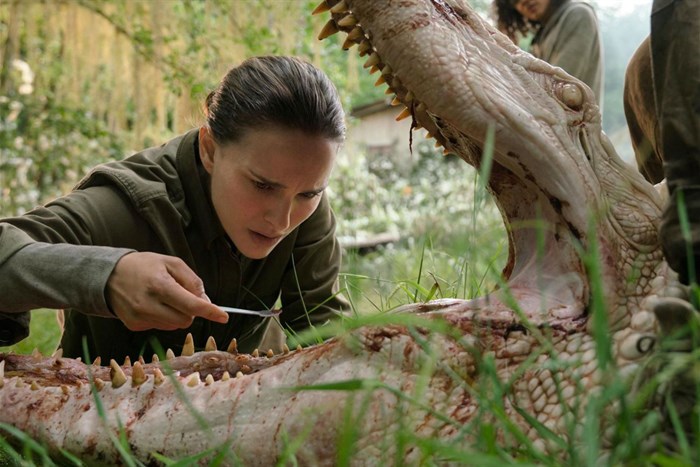The film has also been robbed of the wide promo treatment it deserved. This is very unfortunate for the studio as they have one rare film on their hands. This sci-fi phenomenon is sure to be the topic of discussion in film spaces for many years to come.

Annihilation follows biologist Lena (Natalie Portman) as she tries to overcome the struggle that's come with losing her husband. He had been declared KIA (killed in action) following being deployed on a sealed mission and never having returned, along with his team of scientists. The film centres around the mystery of the expedition crew that disappeared, in particular, Lena's husband as she is absorbed in uncovering the truth after a defining event takes place.
At the beginning of the film, we're shown a strange-coloured meteor striking a lighthouse. The explosion begins to form a sort of caustic bubble that seems to gradually grow bigger and bigger, eradicating or mutating every living thing in its path. The bubble is later named 'The Shimmer' because of its acidic colours and form. Upon this, Lena joins forces with a new and promising expedition team that is deployed in part with finally uncovering what lies beyond The Shimmer, and so live to tell it. Meanwhile, the malignant blob continues on its ruinous course. If it is not neutralised soon, the world as we know it stands to be annihilated.
The all-women team of scientists consists of the complex Dr Ventress (Jennifer Jason Leigh), the head-strong Anya (Gina Rodriguez), the neutral Cass (Tuva Novotny) and the quiet Josie (Tessa Thompson). We soon discover that all these women have nothing to lose as they brave facing whatever lies beyond the toxic atmosphere they're journeying towards, making their motivations less heroic and more self-serving. This sort of characterisation is perhaps the most compelling aspect of the movie, as we later discover that the movie centres on human motivation and/or impulse.

The sequence in which the events unfold is cleverly crafted by the Ex Machina director's masterly hand. He offers a different understanding of storytelling while managing to keep his audience engaged without a hint of alienation. We pan back and forth between flashbacks as the film progresses.
As the story unravels, we begin to see Lena as more of a character device. Her personal journey unfolds in parallel with the plot, as such that one mimics the other. This is a clever way for Garland to re-invent a genre trope, as the film in itself addresses duality. The film brings to focus how nature mimics itself to be able to both destroy and reinvent itself perhaps out of habit or natural impulse. It is in this way a witted allegory on creation, life and the impending death/destruction therein. Nature is thus made the antagonist, upholding anti-hero tropes, as it is unforgiving in its path to purifying, absolving and rebirthing itself.
This movie is clearly meant to induce weariness and anxiety, but it is quiet and subtle in its intention. We're made aware of the fact that our bodies are decaying, and there's nothing we can do about it except to merely watch on. The age-old alt-science theory that perhaps we're not 'merely ageing', but constantly exposing ourselves to fatal radioactive viruses embedded in our long-compromised atmosphere is revisited. Lena goes as far as narrating that perhaps death isn't as natural a course as we think. Perhaps our bodies are disintegrating daily due to airborne viruses until the mutating diseases win us over to the death we've so aimlessly accepted as a way of life. The manner in which Garland depicts this theory is so realistic that it will make your skin crawl in desperation for answers ("Hi, yes, Google, are all humans infected with an unknown virus?" "Google, is death natural or is an unknown virus chewing on our flesh and bones, bit by bit till our bodies can't take it anymore?").

The movie's feet are firmly planted in reality, which is perhaps why it will stay on our minds for longer than it would have been it dramatised. Garland shows discipline in his direction, especially in the action scenes- the only part of the script where he could've let loose and had a field-day displaying himself as a multi-faceted director for future gigs, but this wasn't the film to do it and he knew that.
We don't normally pay much mind to sound design as a general movie-going public, but in this movie the gravity of this aspect of filmmaking is dire. The use of silence and the manipulation of various sounds is as vital to the plot as the characterisations. The rippling, choppy and synthetic sounds set to send you over the edge way before you even realise what you're encountering. Camera positioning and tracking also play a big part in leading us through the consistently mysterious and ghastly story, as the expedition group scrabble their way through the beautiful, humbling woods towards the crucial landmark.
Garland packs this movie with brilliant symbolism that is sure to be dissected for years to come. He goes on to instrumentalise the events that take place among the group of scientists in a manner that parallels events that are taking place in nature as well. This is some way shows the many facets of one truth or prophecy. The women, just as nature, are confronted with the urgency to make sense of their new realities. This pushes them to shamelessly participate in acts that manipulate truths to suit themselves, adamant in their approach and motivations. This is, of course, all motivated by the human impulse to be destructive even when we mean well, or are ignorant of the fact. Lena, much like nature, has had to adapt to losing her life as she knew it. Her old-self has been annihilated, thus all the involuntary change she has gone through has made her unknowingly self-destructive. In this way, she mirrors The Shimmer's (nature) actions in reconstructing itself, by corroding herself in the name of restoration.
Annihilation is a lot to take in. The movie is peppered with complexities and paradoxes from beginning to end. The ending sets to make our heads hurt even more than it provides the answers we had been holding our breaths in anticipation of. Perhaps the simple message behind it is that we're never going to figure anything out. Not the way we expect anyway. Things happen and they happen for a reason, but we might not always get the answers we need. And maybe that's okay too. For as long as you live in the moment and do what's necessary for your own peace of mind at that moment, then that's enough.
Hats off to Garland and the group of filmmakers who made this layered, gloom-inducing psychedelic trip happen. More so that Garland didn't succumb to the pressures that were put on him to make the movie a little more marketable for pop-culture crowds. Annihilation is an absolute fulfilling, nightmarish wonder that has the makings of a cult-classic. For all we know, this could be the prelude to an even bigger story.